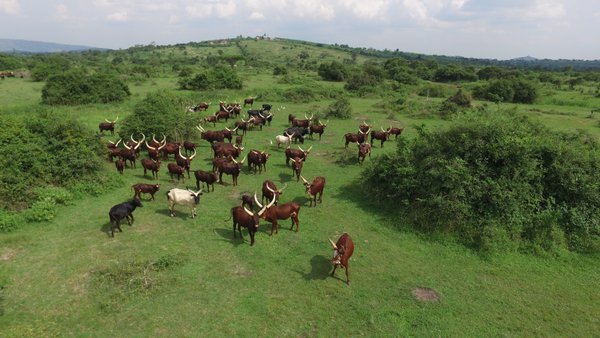As Uganda strategizes to position itself as a regional hub for the export of animal products, there is concern that efforts could be retarded by the careless handling of animals and birds by both farmers and veterinary professionals.
Senior veterinary experts have warned that poor administration of drugs to animals and birds has a negative impact on the quality of products like meat, milk, eggs and honey, hence impacting on consumers’ health.
“The use of veterinary drugs in animals like cattle, goats, poultry, bees has the potential to generate residues in animal derived products,” Dr Fred Monje, a Senior Veterinary Inspector in Uganda’s Ministry of Agriculture Animal Industry and Fisheries (MAAIF), observed. This, he says, leads to contamination and therefore unsuitable for human consumption.
Dr Monje says that veterinary practitioners and farmers must stick to guidelines, warning that the continued improper immunization of animals weakens body processes like metabolism and detoxification which would otherwise help to filter drug residues that exit the body through urine and faeces.
When processes don’t take place normally, the result is the retention of drug residues in body, which then contaminate meat, milk and eggs in chicken, Dr Monje, adding that “the residues can cause diseases like cancer, allergy and damaged cell genes. The residues could also lead to antimicrobial resistance and congenital malformations.”
“The main reason for drug residues in animal products is due to improper usage and failure to keep the withdrawal period,” he says, advising veterinary shops to destroy expired medicines, as guided.
He advises farmers to use qualified veterinary personnel instead of relying on the unqualified ones but also that they avoid exposing chemicals to the environment as it provides most of the animal feeds.
Dr Monje also warns farms to keep their animals away from spilled chemicals as well as improper use agricultural chemicals such as pesticides.
Dr Mareb Acham, also veterinary inspector in the MAAIF says farmers should utilize the services of district veterinary officers, stating that officers have the obligation to guide farmers on the usage of chemicals and antibiotics. “They should not just buy drugs without the advice of veterinary personnel,” he says.
However, despite Dr Acham’s advice, most farmers in Uganda find it hard to access qualified personnel, and if identified, they are so expensive to engage.
The World Animal Health Organization, says Uganda’s veterinary sub sector is understaffed with minimum structures which offer low services, despite the high economic potential of the animal industry. For instance, Uganda produces 1.5 billion litres of milk annually, records from the Uganda Dairy Development Authority show.
“We have had problems of recent while trying to export our beef and milk. Markets like the European Union emphasise the issue of safety so much because they don’t want our products to cause diseases to their citizens,” says a local milk exporter.








prednisone 20mg price in india: http://prednisone1st.store/# prednisone pill prices
online singles dating sites: top date sites – top online dating
[url=https://propecia1st.science/#]buying cheap propecia price[/url] propecia generic
mens ed pills: generic ed drugs – pills erectile dysfunction
п»їMedicament prescribing information.
canadian pharmacies that deliver to the us canadian pharmacy near me
Comprehensive side effect and adverse reaction information.
where buy cheap mobic without rx: where can i get cheap mobic for sale – generic mobic tablets
cost of propecia without a prescription order generic propecia
where can i get cheap mobic without insurance [url=https://mobic.store/#]can i order generic mobic pills[/url] how can i get generic mobic without prescription
https://pharmacyreview.best/# cross border pharmacy canada
best otc ed pills: top ed drugs – male ed drugs
buy amoxicillin online with paypal amoxicillin script – amoxicillin 500 mg
where to buy cheap mobic prices [url=https://mobic.store/#]cost generic mobic prices[/url] how can i get mobic without a prescription
medicine amoxicillin 500mg how to buy amoxycillin – amoxicillin 875 mg tablet
[url=https://propecia1st.science/#]buy propecia no prescription[/url] propecia pills
Everything about medicine.
amoxicillin generic amoxicillin medicine over the counter – amoxicillin brand name
Comprehensive side effect and adverse reaction information.
cost generic propecia without prescription cost generic propecia without prescription
can you get cheap mobic no prescription: cost mobic without dr prescription – generic mobic without prescription
https://mobic.store/# can you get generic mobic without rx
https://pharmacyreview.best/# canadapharmacyonline com
best canadian online pharmacy legitimate canadian pharmacy online
[url=https://propecia1st.science/#]get propecia pills[/url] get propecia price
compare ed drugs: ed meds online – ed pills for sale
best male ed pills: pills for ed – erection pills online
cheap erectile dysfunction pills [url=https://cheapestedpills.com/#]medications for ed[/url] best ed pills online
Some trends of drugs.
canadian pharmacy 24 com canadian pharmacy 365
Cautions.
where to buy mobic without prescription: where to get mobic tablets – where can i buy mobic without dr prescription
mail order pharmacy india: top online pharmacy india – indianpharmacy com
http://indiamedicine.world/# online shopping pharmacy india
zithromax z-pak no prescription
zithromax 250 z-pak tab
extended release metformin
glimepiride with metformin
a nurse is caring for a client who currently takes furosemide and has a new prescription
amlodipine lisinopril
zoloft memory loss
furosemide client education
what is the drug lisinopril used for
can flagyl cause a yeast infection
bactrim and flagyl
gabapentin for sleep dosage
lasix dosage for dogs
glucophage afvallen
can dogs take gabapentin
does cephalexin treat sinus infection
amoxicillin for dental infection
buy zithromax
melatonin and gabapentin
amoxicillin diarrhea
600mg gabapentin
cephalexin for sinus infection
ic escitalopram 20 mg
cephalexin 250 mg
ciprofloxacin goodrx
escitalopram mechanism of action
bactrim for staph
ciprofloxacin 500 para que sirve
cephalexin dosage for skin infection
can cephalexin treat bv
amoxicillin trihydrate
can i drink on bactrim
bactrim aki
bactrim pediatric dose calculator
how to get amoxicillin
gabapentin horniness
gabapentin and flexeril
escitalopram weight
escitalopram in pregnancy
citalopram dosage 10 mg
side effects depakote
citalopram high
medication cozaar
what is hyzaar vs. cozaar
ddavp pediatric dosing
depakote 500 mg twice a day
i took citalopram while pregnant
depakote 500 mg side effects
how should cozaar be taken
citalopram drug interactions
cozaar drugs
depakote drug
ddavp iv drip
ezetimibe posologie
is diclofenac an opiate
augmentin while pregnant
ezetimibe inflammation
augmentin for kidney infection
diclofenac injection
diltiazem dose for afib
diltiazem er 240 mg price
how long do effexor withdrawals last
flexeril and percocet
flomax photosensitivity
effexor effects
flomax relief advert
flexeril sleep
aripiprazole reviews
amitriptyline toxicity
medicine allopurinol
how much amitriptyline can you take
ibuprofen aspirin
aripiprazole generic name
aspirin formula
celebrex and alcohol
how much baclofen can you take
celebrex news
bupropion missed dose
baclofen abuse
what is augmentin 875
augmentin half life
celecoxib celebrex
ashwagandha and blood pressure
prozac and buspirone
celecoxib structure
buspirone kids
ashwagandha breastfeeding
when is the best time to take celexa
celexa side effects weight loss
actos publicos.gov.ar
low dose abilify for anxiety
actos scare
generic abilify
acarbose mylan
acarbose australia
semaglutide 0.25mg/0.5ml
remeron side effects weight gain
robaxin contraindications
repaglinide teva
abilify and remeron
repaglinide prices
half life of robaxin
nexium vs protonix
remeron reddit
ir spectra of repaglinide
synthroid indications
metformin and spironolactone
farxiga and sitagliptin
synthroid alzheimer’s
sitagliptin and heart failure
synthroid vegan
lightheaded synthroid
tamsulosin auge
venlafaxine vs wellbutrin
alpha blockers such as tamsulosin flomax treat benign prostatic hypertrophy by
side effects of voltaren
venlafaxine 37.5
tizanidine use
tizanidine dosage by weight
zyprexa depakote combo
stop hair loss wellbutrin
side effects of stopping zetia
does zyprexa get you high
zetia reviews
pyridium and zofran
can you develop tolerance to zofran
zyprexa symptoms
zyprexa intramuscular
buy wellbutrin in the uk
what kind of medicine is zofran
zofran ems use